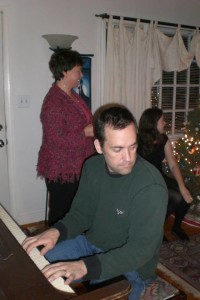
As my family and friends know, three art forms consume my life. The first, the main subject of this website, is writing. The second, which I’ve practiced on and off since age 6, is the piano, particularly classical music performance. And since age 22, it’s been martial arts, on and off.
“On and off” is the key phrase here. It’s so damn hard to keep one’s life balanced, especially when there are all-consuming responsibilities like working a job and raising a family. (And washing the dishes. Some nights, it takes me a half hour. I’ve learned to wear rubber gloves.)
Lately, I’ve discovered — or rediscovered — a truism about getting better at anything. It’s so trite that it’s laughable. But it’s also comforting to learn, once again, that practice makes perfect.
This month, with both my children finally in school, I started practicing the piano again regularly after a nearly 20-year hiatus. Oh, it’s not like I ever gave it up completely. I’ve always held onto my Steinway studio upgright and religiously had it tuned every six months. And I’ve occasionally played music gigs and performed at parties. But not since college have I made a commitment to sit down every day to do something as mundane as practice scales or patiently learn the subtleties of a Mozart sonata.
Mozart’s piano sonata in G major (K. 189h) has been my project lately. Like many of his compositions, it’s a deceptively simple suite of three movements that rarely layers on more than two voices. My edition, edited by Richard Epstein in 1918, makes sparing use of the pedal and allows Mozart’s charm and elegance to shine through.
If only the composer were here to play it. I have an unsubtle set of knobby fingers with hair on the knuckles. It’s hard not to imagine him sitting in my living room, wincing and shaking his head at my attempts to give voice to his creation.

Almost every weekday morning for the past month, I’ve practiced for a half hour before work. I usually do it after working out, which means that, even if I’ve showered and changed clothes, I’m sweating and kind of looking like Mike Myers’s Fat Bastard as I sit there (shirtless, to cool off), dripping onto my piano bench.
I start with scales and arpeggios, all the major and minor keys from C to F. On alternate days, I try to do F up to B. While a piano minor, I was required to practice both hands in parallel (up and down the keyboard together) and in opposition (hands moving in opposite directions). I haven’t recovered the oppositional skills yet, let alone recovered all the scales. I’m thinking if I chop my ring fingers off, I’ll be able to perfect B-flat minor.
This morning, a funny thing happened. After a month of working on the G major sonata, I returned to the first movement of the F major sonata (K. 300k). That’s the first sonata I ever learned with my old teacher Christopher Johnston, when I started with him in the seventh grade. It’s a fun piece with dark colors and sforzando chords that stomp on you when you least expect them.
 I’ve had years to learn bad habits with that one. It’s so much fun to play that I usually slop through the piece, not correcting my errors. (Hell, who has time to rework a fingering when you only have five minutes to play before a toddler walks up and wants to bang the keys?) But this morning, it suddenly sounded different. Better. I wasn’t sure why; it wasn’t like I’d been practicing it. It took a few minutes of talking to myself to figure it out. (I often talk to myself. You wouldn’t want to watch me write.)
I’ve had years to learn bad habits with that one. It’s so much fun to play that I usually slop through the piece, not correcting my errors. (Hell, who has time to rework a fingering when you only have five minutes to play before a toddler walks up and wants to bang the keys?) But this morning, it suddenly sounded different. Better. I wasn’t sure why; it wasn’t like I’d been practicing it. It took a few minutes of talking to myself to figure it out. (I often talk to myself. You wouldn’t want to watch me write.)
The first difference was that I played the piece slower. It gave me time to pay attention to where my sausages landed. And that meant I was being more precise. Mozart music is, if nothing else, precision-driven. I was also more concerned with my phrases and with the crispness of my rests. Whereas before I’d always relied on the sustain pedal to smooth over my lousy transitions, this morning I thought what the hell and tried playing it with almost no pedal at all.
In short, I was using all the same habits I’d used over the past month to learn the other sonata. And the result was it sounded at least twice as better.
Practice. It makes all the difference. I’m noticing similar results in my jiu-jitsu and with my fiction writing.
Now the only riddle to solve is how to keep my perspiration from discoloring the wood.


2 Responses
The same way you keep blood from splattering – put down a tarp 😉
Everything I need to know in life, I learned from Dexter.